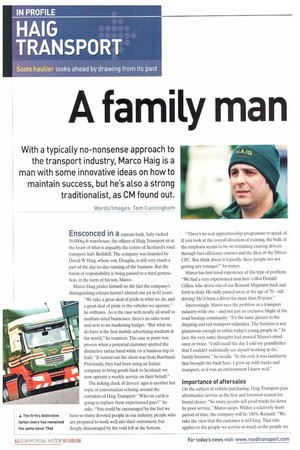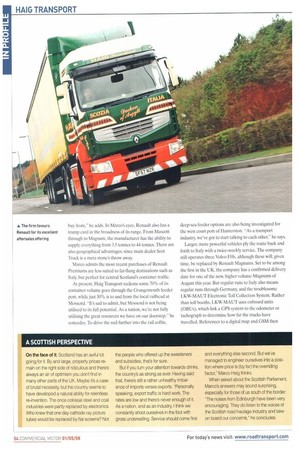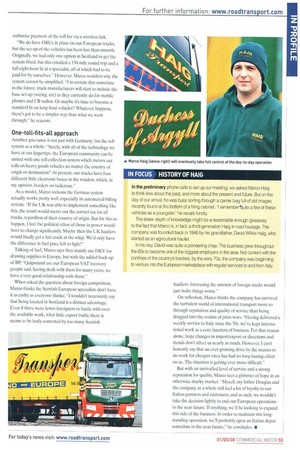A family man
Page 52

Page 54

Page 55

If you've noticed an error in this article please click here to report it so we can fix it.
With a typically no-nonsense approach to the transport industry, Marco Haig is a man with some innovative ideas on how to maintain success, but he's also a strong traditionalist, as CM found out.
Words/Images: Tom Cunningham Ensconced in a custom-built, fully racked 30,000sq-ft warehouse, the offices of Haig Transport sit at the heart of what is arguably the centre of Scotland's road transport hub: Belisha The company was founded by David W Haig, whose son, Douglas, is still very much a part of the day-to-day running of the business. But the baton of responsibility is being passed to a third generation, in the form of his son, Marco.
Marco Haig prides himself on the fact the company's distinguishing colours haven't altered one jot in 62 years. "We take a great deal of pride in what we do, and a great deal of pride in the vehicles we operate," he enthuses. As is the case with nearly all small to medium-sized businesses, there's no sales team and next to no marketing budget. "But what we do have is the best mobile advertising medium in the world," he counters. The case in point was proven when a potential customer spotted the distinctive tartan band while on a business trip to Italy. "It turned out the client was from Barrhead. Previously, they had been using an Italian company to bring goods back to Scotland; we now operate a weekly service on their behalf."
The ticking clock of drivers' ages is another hot topic of conversation echoing around the 4111114 corridors of Haig Transport: "Who on earth is going to replace these experienced guys?" he asks. "You could be encouraged by the fact we have so many devoted people in our industry, people who are prepared to work well into their retirement, but deeply discouraged by the void left at the bottom. "There's no real apprenticeship programme to speak of. If you look at the overall direction of training, the bulk of the emphasis seems to be on retraining existing drivers through fuel efficiency courses and the likes of the Driver CPC. But think about it logically, these people are not getting any younger!" he muses.
Marco has first-hand experience of this type of problem: "We had a very experienced man here called Donald Gillies, who drove one of our Renault Magnums back and forth to Italy. He sadly passed away at the age of 70 — still driving! He'd been a driver for more than 50 years."
Interestingly, Marco secs the problem as a transport industry-wide one — and not just an exclusive blight of the road haulage community. "It's the same picture in the shipping and rail transport industries. The business is not glamorous enough to entice today's young people in." In fact, the very same thoughts had crossed Marco's mind once or twice. "I still recall the day I told my grandfather that I couldn't realistically see myself working in the family business," he recalls. "In the end, it was familiarity that brought me back here. I grew up with trucks and transport, so it was an environment I knew well."
Importance of aftersales
On the subject of vehicle purchasing, Haig Transport puts aftermarket service as the first and foremost reason for brand choice: "So many people sell good trucks let down by poor service," Marco quips. Within a relatively short period of time, the company will be 100% Renault. "We take the view that the customer is still king. That rule applies to the people we service as much as the people we buy from," he adds. In Marco's eyes. Renault also has a trump card in the broadness of its range. From Mascott through to Magnum, the manufacturer has the ability to supply everything from 3.5 tonnes to 44 tonnes. There are also geographical advantages, since main dealer Scot Truck is a mere stone's throw away.
Marco admits the most recent purchases of Renault Premiums are less suited to far-flung destinations such as Italy, hut perfect for central Scotland's container traffic.
At present, Haig Transport reckons some 70% of its container volume goes through the Grangemouth feeder port, while just 30% is to and from the local railhead at Mossend. -It's sad to admit, but Mossend is not being utilised to its full potential. As a nation, were not fully utilising the great resources we have on our doorstep." he concedes. To drive the nail further into the rail coffin, deep-sea feeder options are also being investigated for the west coast port of Hunterston. "As a transport industry, we've got to start talking to each other," he says.
Larger, more powerful vehicles ply the route back and forth to Italy with a twice-weekly service, The company still operates three Volvo His, although these will, given time, be replaced by Renault Magnums. Set to be among the first in the UK. the company has a confirmed delivery date for one of the new, higher volume Magnums of August this year. But regular runs to Italy also means regular runs through Germany, and the troublesome LKW-MAUT Electronic Toll Collection System. Rather than toll booths, LKW-MAUT uses onboard units (OBUs), which link a GPS system to the odometer or tachograph to determine how far the trucks have travelled. References to a digital map and GSM then authorise payment of the toll fee via a wireless link.
"We do have OBUs in place on our European trucks, but the set-up of the vehicles has been less than smooth. Originally, we had only one option in Scotland to get the system fitted, but this entailed a 150-mile round trip and a full eight-hour fit at a specialist, all of which had to be paid for by ourselves." However, Marco wonders why the system cannot be simplified. "I'm certain that sometime in the future, truck manufacturers will start to include the base set-up (wiring, etc) as they currently do for mobile phones and CB radios. Or maybe it's time to become a standard fit on long-haul vehicles? Whatever happens, there's got to be a simpler way than what we went through," he reasons.
One-toll-fits-all approach
Another grievance is not just with Germany, hut the toll system as a whole. "Surely, with all of the technology we have at our fingertips, the European community can be united with one toll collection system which meters out tolls on heavy goods vehicles no matter the country of origin or destination? At present, our trucks have four different little electronic boxes in the window, which, in my opinion, borders on ludicrous."
As a model, Marco reckons the German system actually works pretty well, especially its automated billing system. -If the UK was able to implement something like this, the result would meter out the correct tax for all trucks, regardless of their country of origin. But for this to happen, I feel the political ethos of those in power would have to change significantly. Maybe then the UK hauliers would finally get a fair crack at the whip. We'd only have the difference in fuel price left to fight!"
Talking of fuel, Marco says they mainly use DKV for drawing supplies in Europe, but with the added back-up of BP "Quipsound are our European VAT recovery people and, having dealt with them for many years, we have a very good relationship with them."
When asked the question about foreign competition, Marco thinks the Scottish European specialists don't have it as cushy as everyone thinks: "I wouldn't necessarily say that being located in Scotland is a distinct advantage. Even if there were fewer foreigners to battle with over the available work, what little export traffic there is seems to be hotly contested by too many Scottish hauliers. Increasing the amount of foreign trucks would just make things worse.
On reflection, Marco thinks the company has survived the turbulent world of international transport more so through reputation and quality of service than being dragged into the realms of price wars, -Having delivered a weekly service to Italy since the 70s, we've kept international work as a core function of business. For that reason alone, large changes in import/export or directions and trends don't affect us nearly as much, However, I can't honestly say that an ever-growing drive by the masses to do work for cheaper rates has had no long-lasting effect on us. The situation is getting ever more difficult."
But with an unrivalled level of service and a strong reputation for quality, Marco sees a glimmer of hope in an otherwise murky market: "Myself, my father Douglas and the company as a whole still feel a lot of loyalty to our Italian partners and customers, and as such, we wouldn't take the decision lightly to end our European operations in the near future. If anything, we'll be looking to expand this side of the business. In order to maintain this longstanding operation, we'll probably open an Italian depot sometime in the near future," he concludes. •




















































































































































































